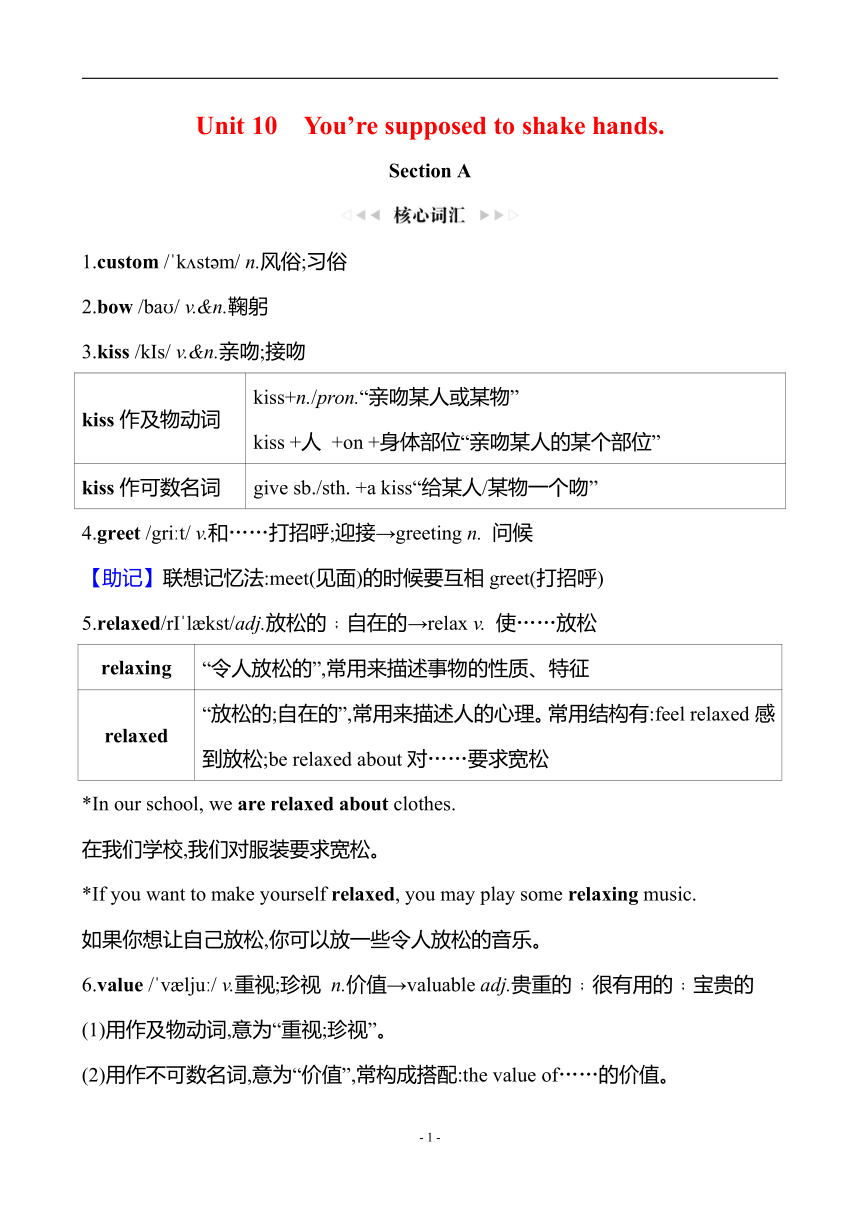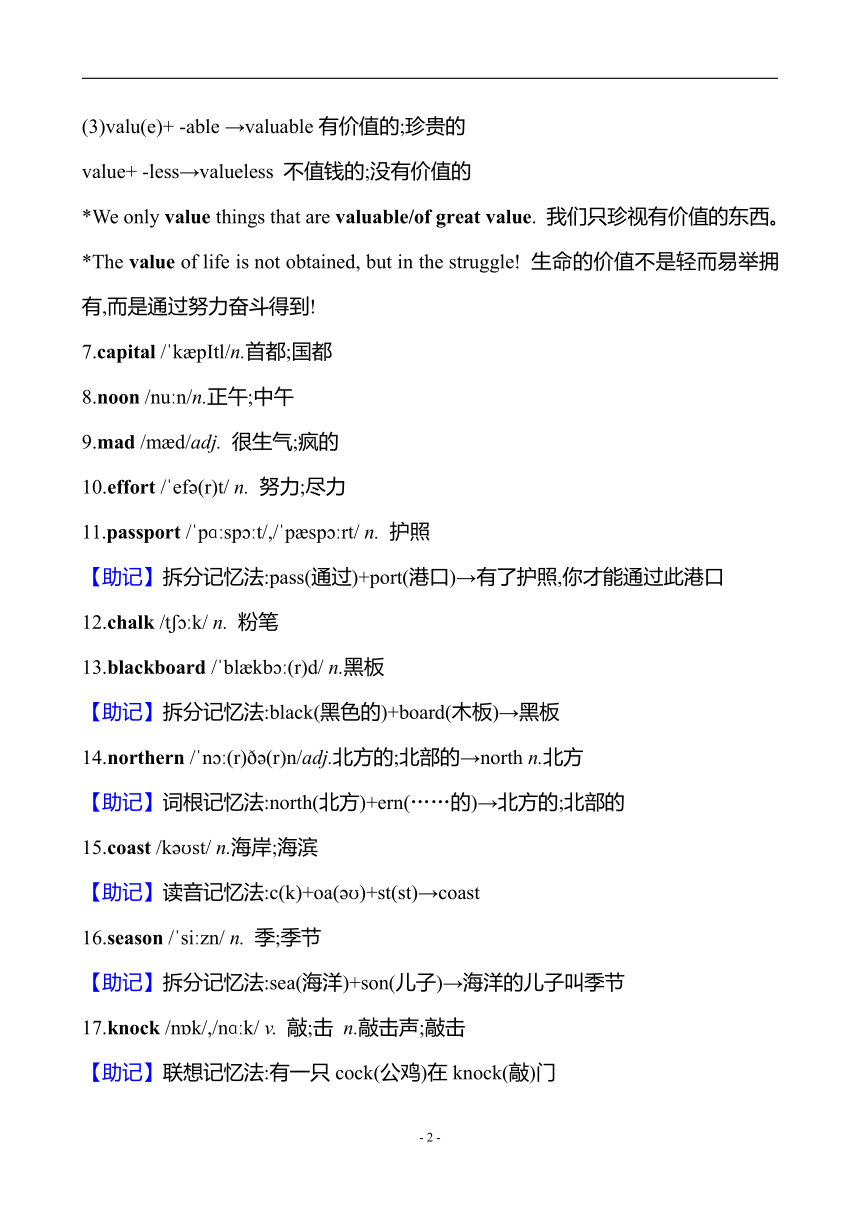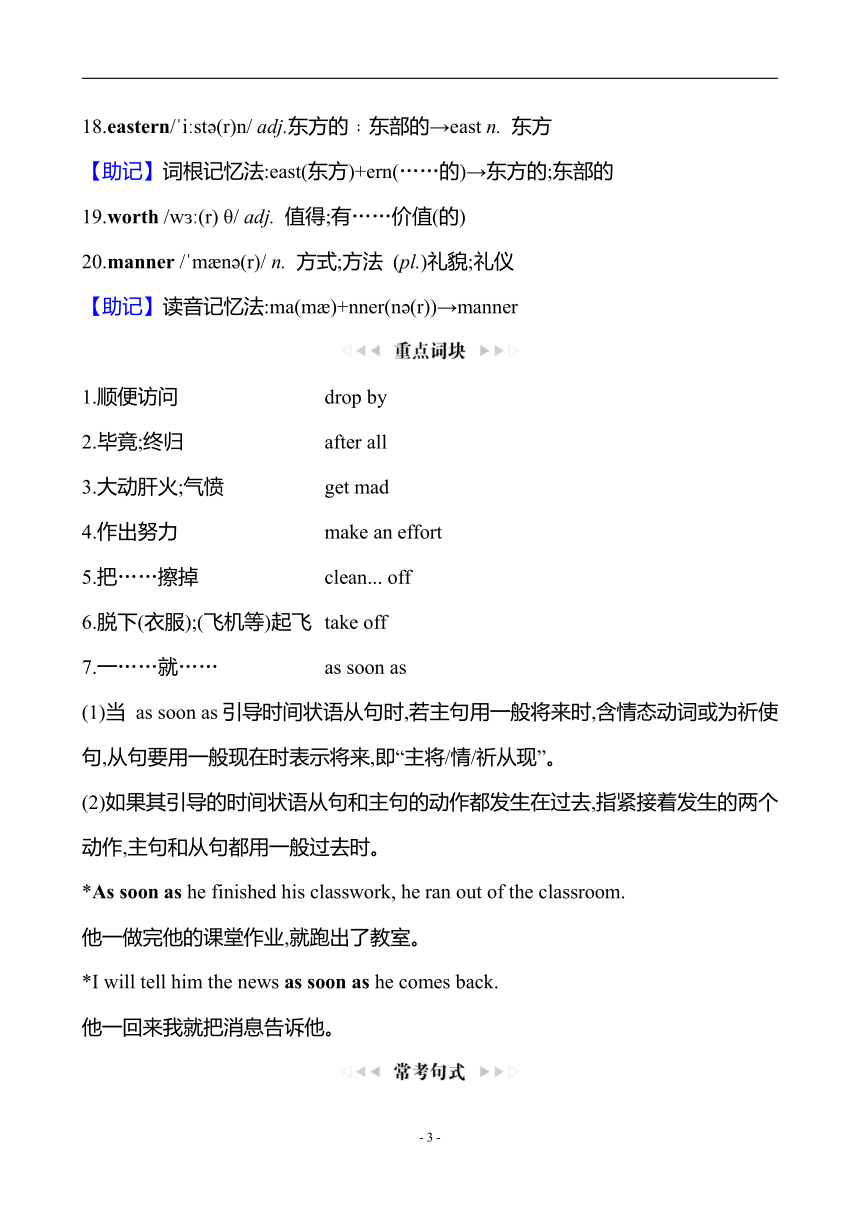人教版九年级全一册Unit 10 You’re supposed to shake hands. 知识清单
文档属性
| 名称 | 人教版九年级全一册Unit 10 You’re supposed to shake hands. 知识清单 |  | |
| 格式 | docx | ||
| 文件大小 | 59.3KB | ||
| 资源类型 | 教案 | ||
| 版本资源 | 人教新目标(Go for it)版 | ||
| 科目 | 英语 | ||
| 更新时间 | 2024-06-09 21:08:04 | ||
图片预览



文档简介
Unit 10 You’re supposed to shake hands.
Section A
1.custom / k st m/ n.风俗;习俗
2.bow /ba / v.&n.鞠躬
3.kiss /kIs/ v.&n.亲吻;接吻
kiss作及物动词 kiss+n./pron.“亲吻某人或某物” kiss +人 +on +身体部位“亲吻某人的某个部位”
kiss作可数名词 give sb./sth. +a kiss“给某人/某物一个吻”
4.greet /gri t/ v.和……打招呼;迎接→greeting n. 问候
【助记】联想记忆法:meet(见面)的时候要互相greet(打招呼)
5.relaxed/rI l kst/adj.放松的﹔自在的→relax v. 使……放松
relaxing “令人放松的”,常用来描述事物的性质、特征
relaxed “放松的;自在的”,常用来描述人的心理。常用结构有:feel relaxed感到放松;be relaxed about对……要求宽松
*In our school, we are relaxed about clothes.
在我们学校,我们对服装要求宽松。
*If you want to make yourself relaxed, you may play some relaxing music.
如果你想让自己放松,你可以放一些令人放松的音乐。
6.value / v lju / v.重视;珍视 n.价值→valuable adj.贵重的﹔很有用的﹔宝贵的
(1)用作及物动词,意为“重视;珍视”。
(2)用作不可数名词,意为“价值”,常构成搭配:the value of……的价值。
(3)valu(e)+ -able →valuable有价值的;珍贵的
value+ -less→valueless 不值钱的;没有价值的
*We only value things that are valuable/of great value. 我们只珍视有价值的东西。
*The value of life is not obtained, but in the struggle! 生命的价值不是轻而易举拥有,而是通过努力奋斗得到!
7.capital / k pItl/n.首都;国都
8.noon /nu n/n.正午;中午
9.mad /m d/adj. 很生气;疯的
10.effort / ef (r)t/ n. 努力;尽力
11.passport / pɑ sp t/,/ p sp rt/ n. 护照
【助记】拆分记忆法:pass(通过)+port(港口)→有了护照,你才能通过此港口
12.chalk /t k/ n. 粉笔
13.blackboard / bl kb (r)d/ n.黑板
【助记】拆分记忆法:black(黑色的)+board(木板)→黑板
14.northern / n (r) (r)n/adj.北方的;北部的→north n.北方
【助记】词根记忆法:north(北方)+ern(……的)→北方的;北部的
15.coast /k st/ n.海岸;海滨
【助记】读音记忆法:c(k)+oa( )+st(st)→coast
16.season / si zn/ n. 季;季节
【助记】拆分记忆法:sea(海洋)+son(儿子)→海洋的儿子叫季节
17.knock /n k/,/nɑ k/ v. 敲;击 n.敲击声;敲击
【助记】联想记忆法:有一只cock(公鸡)在knock(敲)门
18.eastern/ i st (r)n/ adj.东方的﹔东部的→east n. 东方
【助记】词根记忆法:east(东方)+ern(……的)→东方的;东部的
19.worth /w (r) θ/ adj. 值得;有……价值(的)
20.manner / m n (r)/ n. 方式;方法 (pl.)礼貌;礼仪
【助记】读音记忆法:ma(m )+nner(n (r))→manner
1.顺便访问 drop by
2.毕竟;终归 after all
3.大动肝火;气愤 get mad
4.作出努力 make an effort
5.把……擦掉 clean... off
6.脱下(衣服);(飞机等)起飞 take off
7.一……就…… as soon as
(1)当 as soon as引导时间状语从句时,若主句用一般将来时,含情态动词或为祈使句,从句要用一般现在时表示将来,即“主将/情/祈从现”。
(2)如果其引导的时间状语从句和主句的动作都发生在过去,指紧接着发生的两个动作,主句和从句都用一般过去时。
*As soon as he finished his classwork, he ran out of the classroom.
他一做完他的课堂作业,就跑出了教室。
*I will tell him the news as soon as he comes back.
他一回来我就把消息告诉他。
1.我应该穿牛仔裤吗
Am I supposed to wear jeans
2.你不应该亲吻。
You’re not supposed to kiss.
3.让别人等着是很不礼貌的。
It’s very impolite to keep others waiting.
4.我们珍惜平日生活中和家人、朋友在一起的时光。
We value the time we spend with our family and friends in our everyday lives.
5.而且,我们也从不事先未通电话便登门拜访朋友。
Also,we never visit a friend’s house without calling first.
Section B
1.empty / empti/ adj. 空的;空洞的
【助记】读音记忆法:em(em)+p(p)+ty(ti)→empty
2.basic/ beIsIk/ adj. 基本的;基础的→ base n. 基础
3.exchange/Iks t eInd /n.&v.交换
【助记】拆分记忆法:ex+change(变化)
4.teenage / ti neId / adj.十几岁的;青少年的
5.granddaughter / gr nd t (r)/ n.(外)孙女→grandson n.(外)孙子→grandparents (外)祖父母
6.behave /bI heIv/ v.表现;举止→behavior n.行为
【助记】拆分记忆法:be(是;存在)+have(有)→是有不错的表现
behave多用作不及物动词,意为“表现;举止”,指做出某种举动或说出某种话。behave后常用well,badly,bravely等副词修饰。
*Mike behaved bravely in the face of danger.
面对危险迈克表现很勇敢。
*You are supposed to behave politely before the old.
在长辈面前你应该表现得有礼貌。
7.except /Ik sept/ prep.除……之外 conj. 除了;只是
词语 用法 助记
except 除……之外,except后跟的人或物不在前面描述的情况之列
besides 除……之外(还有),besides后跟的人或物包含在前面描述的情况之列
*The students go to school every day except Saturday and Sunday.
除了周六、周日外,学生们每天去上学。(周六、周日不在“每天”之列)
*As a singer, she also dances well besides singing. 作为一个歌手,除唱歌外,她跳舞也很好。(唱歌包含在“好”之列)
8.elbow / elb / n.肘;胳膊
9.gradually / gr d u li/ adv. 逐步地;渐进地
10.suggestion /s d est n/ n.建议
【助记】词根记忆法:suggest(建议)+ion(名词后缀)
1.特地;格外努力 go out of one’s way
go out of one’s way意为“特地;格外努力”,后常跟不定式。
*After work, Mr Green went out of his way to buy some flowers for his wife.
下班后格林先生特地给他妻子买了一些花。
2.使(某人)感到宾至如归 make... feel at home
3.习惯于 get used to
get used to意为“习惯于”。其中to是介词,后常跟名词、代词或v.-ing形式。
*Tom has got used to the rules in our school.
汤姆已经习惯了我们学校的规章制度。
*You will get used to running.
你会习惯跑步的。
1.他们不辞劳苦地使我感到宾至如归。
They go out of their way to make me feel at home.
2.你简直都不相信就因为那样我的法语提高得很快。
You wouldn’t believe how quickly my French has improved because of that.
3.我最大的挑战是学习餐桌礼仪。
My biggest challenge is learning how to behave at the dinner table.
4.例如,你不应该把面包放在你的盘子里。
For example, you’re not supposed to put your bread on your plate.
5.起初我认为那是很奇怪的,但现在我已经习惯它了。
I thought that was pretty strange at first, but now I’m used to it.
6.另一件事是说你吃饱了是不礼貌的。
Another thing is that it is impolite to say you’re full.
7.我不得不说我发现记住一切是困难的,但我逐渐习惯了它。
I have to say that I find it difficult to remember everything, but I’m gradually getting used to it.
- 7 -
Section A
1.custom / k st m/ n.风俗;习俗
2.bow /ba / v.&n.鞠躬
3.kiss /kIs/ v.&n.亲吻;接吻
kiss作及物动词 kiss+n./pron.“亲吻某人或某物” kiss +人 +on +身体部位“亲吻某人的某个部位”
kiss作可数名词 give sb./sth. +a kiss“给某人/某物一个吻”
4.greet /gri t/ v.和……打招呼;迎接→greeting n. 问候
【助记】联想记忆法:meet(见面)的时候要互相greet(打招呼)
5.relaxed/rI l kst/adj.放松的﹔自在的→relax v. 使……放松
relaxing “令人放松的”,常用来描述事物的性质、特征
relaxed “放松的;自在的”,常用来描述人的心理。常用结构有:feel relaxed感到放松;be relaxed about对……要求宽松
*In our school, we are relaxed about clothes.
在我们学校,我们对服装要求宽松。
*If you want to make yourself relaxed, you may play some relaxing music.
如果你想让自己放松,你可以放一些令人放松的音乐。
6.value / v lju / v.重视;珍视 n.价值→valuable adj.贵重的﹔很有用的﹔宝贵的
(1)用作及物动词,意为“重视;珍视”。
(2)用作不可数名词,意为“价值”,常构成搭配:the value of……的价值。
(3)valu(e)+ -able →valuable有价值的;珍贵的
value+ -less→valueless 不值钱的;没有价值的
*We only value things that are valuable/of great value. 我们只珍视有价值的东西。
*The value of life is not obtained, but in the struggle! 生命的价值不是轻而易举拥有,而是通过努力奋斗得到!
7.capital / k pItl/n.首都;国都
8.noon /nu n/n.正午;中午
9.mad /m d/adj. 很生气;疯的
10.effort / ef (r)t/ n. 努力;尽力
11.passport / pɑ sp t/,/ p sp rt/ n. 护照
【助记】拆分记忆法:pass(通过)+port(港口)→有了护照,你才能通过此港口
12.chalk /t k/ n. 粉笔
13.blackboard / bl kb (r)d/ n.黑板
【助记】拆分记忆法:black(黑色的)+board(木板)→黑板
14.northern / n (r) (r)n/adj.北方的;北部的→north n.北方
【助记】词根记忆法:north(北方)+ern(……的)→北方的;北部的
15.coast /k st/ n.海岸;海滨
【助记】读音记忆法:c(k)+oa( )+st(st)→coast
16.season / si zn/ n. 季;季节
【助记】拆分记忆法:sea(海洋)+son(儿子)→海洋的儿子叫季节
17.knock /n k/,/nɑ k/ v. 敲;击 n.敲击声;敲击
【助记】联想记忆法:有一只cock(公鸡)在knock(敲)门
18.eastern/ i st (r)n/ adj.东方的﹔东部的→east n. 东方
【助记】词根记忆法:east(东方)+ern(……的)→东方的;东部的
19.worth /w (r) θ/ adj. 值得;有……价值(的)
20.manner / m n (r)/ n. 方式;方法 (pl.)礼貌;礼仪
【助记】读音记忆法:ma(m )+nner(n (r))→manner
1.顺便访问 drop by
2.毕竟;终归 after all
3.大动肝火;气愤 get mad
4.作出努力 make an effort
5.把……擦掉 clean... off
6.脱下(衣服);(飞机等)起飞 take off
7.一……就…… as soon as
(1)当 as soon as引导时间状语从句时,若主句用一般将来时,含情态动词或为祈使句,从句要用一般现在时表示将来,即“主将/情/祈从现”。
(2)如果其引导的时间状语从句和主句的动作都发生在过去,指紧接着发生的两个动作,主句和从句都用一般过去时。
*As soon as he finished his classwork, he ran out of the classroom.
他一做完他的课堂作业,就跑出了教室。
*I will tell him the news as soon as he comes back.
他一回来我就把消息告诉他。
1.我应该穿牛仔裤吗
Am I supposed to wear jeans
2.你不应该亲吻。
You’re not supposed to kiss.
3.让别人等着是很不礼貌的。
It’s very impolite to keep others waiting.
4.我们珍惜平日生活中和家人、朋友在一起的时光。
We value the time we spend with our family and friends in our everyday lives.
5.而且,我们也从不事先未通电话便登门拜访朋友。
Also,we never visit a friend’s house without calling first.
Section B
1.empty / empti/ adj. 空的;空洞的
【助记】读音记忆法:em(em)+p(p)+ty(ti)→empty
2.basic/ beIsIk/ adj. 基本的;基础的→ base n. 基础
3.exchange/Iks t eInd /n.&v.交换
【助记】拆分记忆法:ex+change(变化)
4.teenage / ti neId / adj.十几岁的;青少年的
5.granddaughter / gr nd t (r)/ n.(外)孙女→grandson n.(外)孙子→grandparents (外)祖父母
6.behave /bI heIv/ v.表现;举止→behavior n.行为
【助记】拆分记忆法:be(是;存在)+have(有)→是有不错的表现
behave多用作不及物动词,意为“表现;举止”,指做出某种举动或说出某种话。behave后常用well,badly,bravely等副词修饰。
*Mike behaved bravely in the face of danger.
面对危险迈克表现很勇敢。
*You are supposed to behave politely before the old.
在长辈面前你应该表现得有礼貌。
7.except /Ik sept/ prep.除……之外 conj. 除了;只是
词语 用法 助记
except 除……之外,except后跟的人或物不在前面描述的情况之列
besides 除……之外(还有),besides后跟的人或物包含在前面描述的情况之列
*The students go to school every day except Saturday and Sunday.
除了周六、周日外,学生们每天去上学。(周六、周日不在“每天”之列)
*As a singer, she also dances well besides singing. 作为一个歌手,除唱歌外,她跳舞也很好。(唱歌包含在“好”之列)
8.elbow / elb / n.肘;胳膊
9.gradually / gr d u li/ adv. 逐步地;渐进地
10.suggestion /s d est n/ n.建议
【助记】词根记忆法:suggest(建议)+ion(名词后缀)
1.特地;格外努力 go out of one’s way
go out of one’s way意为“特地;格外努力”,后常跟不定式。
*After work, Mr Green went out of his way to buy some flowers for his wife.
下班后格林先生特地给他妻子买了一些花。
2.使(某人)感到宾至如归 make... feel at home
3.习惯于 get used to
get used to意为“习惯于”。其中to是介词,后常跟名词、代词或v.-ing形式。
*Tom has got used to the rules in our school.
汤姆已经习惯了我们学校的规章制度。
*You will get used to running.
你会习惯跑步的。
1.他们不辞劳苦地使我感到宾至如归。
They go out of their way to make me feel at home.
2.你简直都不相信就因为那样我的法语提高得很快。
You wouldn’t believe how quickly my French has improved because of that.
3.我最大的挑战是学习餐桌礼仪。
My biggest challenge is learning how to behave at the dinner table.
4.例如,你不应该把面包放在你的盘子里。
For example, you’re not supposed to put your bread on your plate.
5.起初我认为那是很奇怪的,但现在我已经习惯它了。
I thought that was pretty strange at first, but now I’m used to it.
6.另一件事是说你吃饱了是不礼貌的。
Another thing is that it is impolite to say you’re full.
7.我不得不说我发现记住一切是困难的,但我逐渐习惯了它。
I have to say that I find it difficult to remember everything, but I’m gradually getting used to it.
- 7 -
同课章节目录
- Unit 1 How can we become good learners.
- Section A
- Section B
- Unit 2 I think that mooncakes are delicious!
- Section A
- Section B
- Unit 3 Could you please tell me where the restroom
- Section A
- Section B
- Unit 4 I used to be afraid of the dark.
- Section A
- Section B
- Unit 5 What are the shirts made of?
- Section A
- Section B
- Review of Units 1-5
- Unit 6 When was it invented?
- Section A
- Section B
- Unit 7 Teenagers should be allowed to choose their
- Section A
- Section B
- Unit 8 It must belong to Carla.
- Section A
- Section B
- Unit 9 I like music that I can dance to.
- Section A
- Section B
- Unit 10 You're supposed to shake hands.
- Section A
- Section B
- Review of Units 6-10
- Unit 11 Sad movies make me cry.
- Section A
- Section B
- Unit 12 Life is full of the unexpected
- Section A
- Section B
- Unit 13 We're trying to save the earth!
- Section A
- Section B
- Unit 14 I remember meeting all of you in Grade 7.
- Section A
- Section B
- Review of Units 11-14
